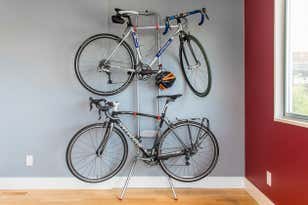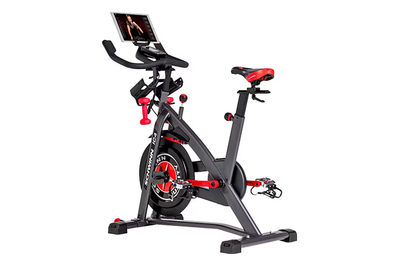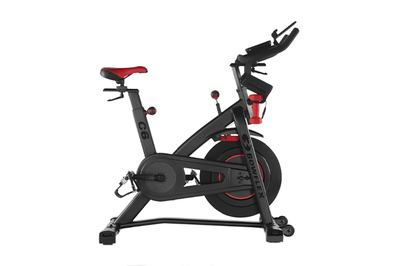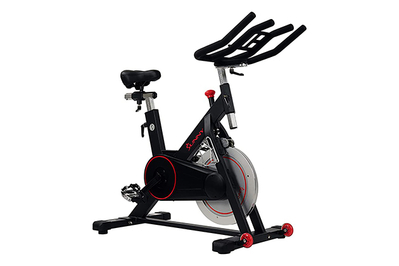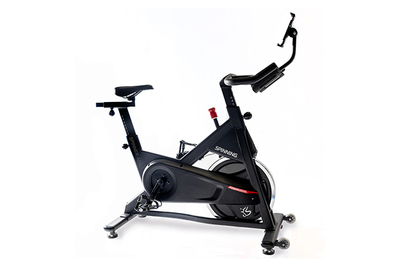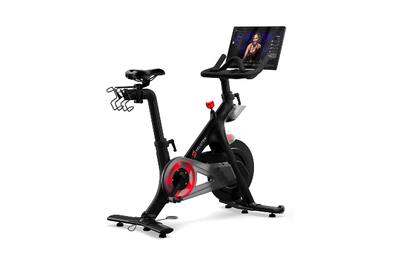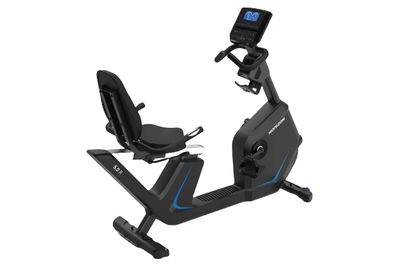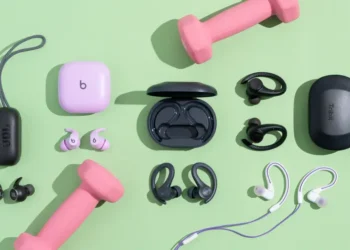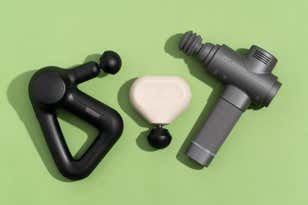The research
- How our picks compare
- Who this is for
- Why you should trust us
- How we picked and tested
- Top pick: Schwinn IC4, BowFlex C6
- Budget pick: Sunny Health & Fitness Magnetic Belt Drive Indoor Cycling Bike SF-B1805
- Best for those who prefer friction resistance: Spinning Aero Connected Spinner Bike
- Best for the full Peloton experience: Peloton Bike
- Best for reclined riding: Horizon Fitness 5.0R
- Other exercise bikes worth considering
- The competition
- Sources
How our picks compare
| Console with metrics |
Connectivity | Dimensions (LWH, inches) |
Maximum rider weight (pounds) |
Recommended rider height range |
Pedal type | Resistance type | Warranty | |
| Schwinn IC4 / BowFlex C6 | yes | yes (Bluetooth) | 48.7 by 21.2 by 51.8 | 330 | 5-foot-1 to 6-foot-4 | clip-in (SPD) and toe cage | magnetic | 10 years frame; three years parts and electronics; one year labor |
| Peloton Bike | yes (touchscreen) | onboard branded content | 59 by 23 by 53 | 297 | 4-foot-11 to 6-foot-4 | clip-in (Delta) | magnetic | Five years frame; 12 months tablet, mechanics, parts, and service |
| Spinning Aero Connected Spinner Bike | no | yes (included cadence sensor) | 44.8 by 21.3 by 54.4 | 275 | 4-foot-11 to 6-foot-5 | clip-in (SPD) and toe cage | friction | One year, no labor; optional one-year ($98), two-year ($168), or three-year ($227) protection plan |
| Horizon Fitness 5.0R | yes | yes (Bluetooth) | 66 by 25.2 by 52.2 | 300 | 5-foot-2 to 6-foot-4 | straps | magnetic | Lifetime frame; one-year parts and labor |
| Sunny Health & Fitness Magnetic Belt Drive Indoor Cycling Bike SF-B1805 | no | no | 48 by 23 by 45 | 300 | 28- to 38-inch inseam | toe cage | magnetic | Three years frame; 180 days parts and components |
Who this is for
Anyone looking to improve or maintain their cardiovascular fitness could find value in an at-home exercise bike. It could also be a tool for low-impact rehabilitation of an injury. (Be sure to check with your health-care provider before starting an exercise or rehabilitation program.)
For many, a big draw is the ability to ride along with an app, approximating an in-person indoor-cycling class. We tested bikes with onboard content streaming as well as those without built-in screens. Some screen-less bikes allow for wireless connectivity and responsive functionality, enabling riders to use their own devices to sync to their favorite indoor-cycling apps, including Zwift (iOS, Android), which focuses on road-style cycling, or Studio Sweat on Demand (iOS, Android), which offers more traditional indoor-cycling classes. You can also use the Peloton app with many non-Peloton bikes (without the live leaderboard and full real-time stats that many Peloton Bike fans love).
Mad Dogg Athletics trademarked the word “Spin” (along with “Spinning” and “Spinner”) in the early 1990s; the company is protective of its usage. We use the generic term “indoor cycling” frequently throughout this guide.
Our focus is on stationary indoor-cycling and recumbent bikes. We have not tested upright exercise bikes, which put you in an upright riding position, or fan bikes, which utilize rider-generated air resistance. We haven’t comparatively reviewed bike trainers, which some people favor for cycling indoors. Trainers are attachments that you fix to an outdoor bicycle’s rear wheel, turning it into a stationary bike, and smart trainers automatically vary the resistance of a bike’s flywheel and can connect wirelessly, allowing you to race against others. (Wirecutter editor Christine Ryan has ridden with a Wahoo Kickr bike trainer since 2020.)
Why you should trust us
Seth is a senior staff writer covering fitness, including writing Wirecutter’s guides to treadmills and rowing machines, among others. Ingrid is a Wirecutter editor and certified personal trainer. For this guide:
- In 2020 and 2022, Ingrid consulted five experts to get a sense of what to keep in mind when contemplating — and riding — a stationary indoor-cycling bike. In 2025, Seth interviewed two additional experts to learn more about recumbent bikes, specifically.
- We’ve attended various home fitness trade shows over the years, where we scout and research exercise bikes, among other large equipment.
- We chose the experts we consulted for this article for their knowledge and independence. We have disclosed any affiliations that experts have with companies mentioned in this article for transparency and accuracy.
- In accordance with Wirecutter editorial standards and to avoid any conflict of interest, we don’t own stock or have any other financial interest in any company or industry that we cover or are likely to cover.
How we picked and tested

Over the past five years, we’ve tested 24 indoor-cycling bikes. Along the way, 25 volunteer testers — from indoor-cycling beginners to aficionados who brought their own shoes — have taken some of the bikes for a spin. This included members of our paid tester panel, who gave handy feedback on how various bikes accommodate people with vision impairments or balance issues.
During our selection process and testing, we focused on the following criteria:
- Overall build: We noted any unsteadiness when seated or when we stood out of the saddle. Across all the models we tested, we most often encountered wobbles in the handlebars. We also compared warranties.
- Fit and adjustability: We noted seat-post height and whether the seat and handlebars moved fore and aft. We also assessed the overall ease of adjustability.
- Pedals: We evaluated bikes with both toe cages (cycling shoes not required) and clip-in pedals (SPD clip-ins or Delta clip-ins). Some bikes have both.
- Handlebars: We took into account the orientation of the handlebars and their shape. We also paid attention to how their surface felt (textured? smooth? tacky?) and if they proved difficult to reach for short or long arms.
- Seat comfort: We encountered both slim, racing-style seats and wider, more padded ones. Some seats can be swapped out. You can also purchase cushioned bike-seat covers to dial in comfort.
- Resistance: We assessed the definitiveness of the resistance changes and whether those changes felt satisfying, muddy, or somewhere in between. We wanted an appropriate range of resistances, allowing for everything from a light spin to a heavy mash.
- Noise: Most of the bikes we tested rode smoothly with no excess racket. Knocks, clicks, and other annoying noises are common complaints found in customer reviews.
- Console or screen: Some of the bikes we tested had no screen. Others included a console — from simple LCD displays to more advanced touchscreen displays — showing metrics such as time, distance, speed, cadence (expressed as revolutions per minute, or RPM), and heart rate. Where applicable, we assessed the ease of navigating any onboard displays.
- Connectivity: You do not need to connect your exercise bike to anything to enjoy a satisfying workout. Two of our picks have optional companion apps that you can subscribe to for a monthly fee. Some bikes let you connect to apps (such as Peloton, Zwift, and the like) via Bluetooth.
- Accessories: We assessed the quality and placement of water-bottle holders and device holders, some of which we found unsturdy or located in tough-to-reach places.
- Care and maintenance: Maintaining your exercise bike should be fairly simple. Sweat, which is highly corrosive, is no friend to any exercise bike and will introduce rust over time. Wiping down your bike regularly can help keep it rust-free longer.
Top pick: Schwinn IC4, BowFlex C6

The Schwinn IC4 is the same bike as the BowFlex C6. (Johnson Health Tech owns both Schwinn and BowFlex.) We confirmed with a spokesperson at Schwinn that the two bikes are identical. We recommend that you compare their prices before buying. From this point our review focuses on the IC4, but we’ve tested and recommend both.
It has a generous warranty. The IC4’s frame is covered for 10 years, and the parts for three years; and you get one year for any repairs requiring a technician. There are optional extended protection plans (such as five-year parts and labor for $109).
It has a simple screen but offers plenty of information. The IC4 has an LCD console that displays a full suite of metrics regardless of whether it’s connected to an indoor-cycling app, but it also has Bluetooth connectivity, which allows the bike to connect to eight different cycling apps and a heart-rate monitor. (The bike does not have a built-in touchscreen, however you can easily mount your own tablet at eye level if desired.)
It’s easy to adjust the bike for your height. You adjust the handlebars and seat via handles that tighten each screw and can be ratcheted out of harm’s way. The IC4’s handlebars adjust fore and aft as well as up and down, which can help you refine the fit and comfort (in comparison, the Peloton Bike’s handlebars adjust only up and down). A small, inward-facing, paddle-like extension at the tip of each handlebar provides a surprisingly satisfying surface to hold during out-of-the-saddle (standing) riding.
Its maximum weight capacity is 330 pounds — the highest maximum weight capacity among our picks — and it is recommended for people between 4-foot-6 and 6-foot-6. The IC4 feels solid yet is the lightest of our picks at 106 pounds — which might matter to you if you plan to move it around your home often. (The bike has two front-mounted transportation wheels to facilitate positioning.)
You can ride with or without cycling shoes with SPD clips. We like that the bike has toe-cage pedals on the flip side for use with non-cycling shoes. No matter which shoes you wear, changing speeds is relatively simple, as a knob smoothly adjusts the heaviness of the resistance, though one tester thought that it caught a bit on occasion. Pressing down on the resistance knob brings the flywheel to a halt. “I like the way the knob works because I can crank it up from the 30s to 70 or 80 with two rigorous twists,” a long-term tester said.
It’s easy to keep track of stats while riding. We found this model’s robust console useful during rides: Cadence (rpm tracks on a graph at the top of the display, followed by time, calories burned, speed, distance, level (resistance, from 1 to 100), and heart rate. The IC4’s included heart-rate armband strap connected easily for us, as did our GPS running watch, which broadcast its readings on the bike’s display. The IC4’s Bluetooth capabilities allow for connection to (and varying degrees of interaction with) cycling apps such as Jrny (iOS, Android), Peloton, Rouvy, and Zwift, as well as activity-tracking apps like MyFitnessPal and Apple Health. In our tests, the bike easily connected to the Peloton app, showing real-time cadence, though it doesn’t indicate watts (a measure of power output). The IC4 comes with two 3-pound dumbbells (which hang on its front), for off-the-bike workouts or in-the-saddle arm work (the subject of some controversy within the indoor-cycling world). Like many connected exercise bikes, this model must be plugged into an outlet.
A two-month subscription to Jrny is included in the price of the IC4 and is $12 per month or $100 per year thereafter. You are not required to use it.
Flaws but not dealbreakers
It’s a good-sized bike for most people but not everybody. We’ve hit a knee (or two) on a taller water bottle while pedaling — a combination of the slight angle of the water-bottle holders and personal fit.
Adjusting the bike takes some effort. The seat and handlebar adjustments aren’t numbered, so your setting isn’t marked as obviously as on some other bikes. The seat’s fore and aft seat adjustment uses tick marks.
Some workout features in the accompanying app seem bland and basic. The Jrny app provides a mix of video- and audio-prompted rides and workouts. The video rides are fine but lack the energy and wide range of intensity levels that other platforms offer. We also wish the cadence (rpm) showed as a standalone number instead of on a sliding graph at the top of the console, for greater specificity.
The bike’s connectivity has some limitations. Although you can connect via Bluetooth to Peloton workouts, the experience isn’t seamless, since the IC4’s resistance range doesn’t match directly with Peloton’s. Riders have come up with various conversions to help match the resistance numbers.
Budget pick: Sunny Health & Fitness Magnetic Belt Drive Indoor Cycling Bike SF-B1805

Even in a room of competitors that cost twice as much or more, the Sunny Health & Fitness Magnetic Belt Drive Indoor Cycling Bike SF-B1805 stood out for its general soundness. “I was impressed with how sturdy this bike was,” noted one tester, who, like all the others, was unaware of each model’s price tag. “I always felt like I was on solid footing.” Unlike the Schwinn IC4, this bike doesn’t need to be plugged into an outlet, if you’d prefer to pedal without metrics.
The seat is comfy and well padded. The SF-B1805 has a generously padded seat, which may take some getting used to if you’re accustomed to cycling in a studio. (Most of the other seats we perched on had slimmer silhouettes and less cushioning.) Many of our beginner cyclists liked the extra comfort, especially on longer rides.
You can comfortably rest a large tablet or laptop near the handles. The SF-B1805 does not come with an integrated tablet, so you need to use your own. But a flat surface on top of the handlebars accommodates a device nicely, though another tester wished that its angle pointed her tablet at her more directly. Seth rested a 14-inch MacBook Pro on the flat surface and found it securely held the laptop in place while biking during Zoom meetings (camera off, of course). The handlebars have four prongs (our other picks all have two), and they are the longest of those on the bikes we recommend: One tester remarked that they reminded him of “a giant elk.”
The magnetic resistance adjusts smoothly and responsively. One tester thought there was “less of a distance between ‘easy’ and ‘hard,’” appreciating that she could put something on the wheel without turning the knob excessively to the right. We initially thought that the maximum resistance felt light, though after we became more familiar with the bike’s resistance range, it felt appropriate. Even though the bike does not provide metrics, there’s nothing keeping you from pedaling along to a video class. More-experienced riders can follow an instructor’s leg speed and adjust the resistance by feel.
Compared with most similarly priced bikes, it can support bigger riders. The bike accommodates riders with inseams between 28 inches and 38 inches. (Inseam — a measure of inner-leg length, typically from crotch to ankle — is an unconventional way to present suggested height parameters.) The maximum rider weight is 300 pounds. The adjustment process isn’t as elegant as on some of our other picks; there are no holes in the handlebar or seat posts to definitely lock into a spot. Even so, we didn’t experience any slipping or jostling loose.
Flaws but not dealbreakers
The SF-B1805 does not have a console or display metrics. But you could add a cadence sensor to the bike, effectively enabling it to connect to cycling apps.
The water-bottle holder is oddly tricky to reach. It’s located on the lower-right side of the bike, which our testers found hard to reach in comparison with the more conveniently placed bottle holders of our other picks.
The warranty is one of the weakest among our picks. Three years for the structural frame and 180 days for the parts and components is not a great warranty. During our tests, the sticker on the flywheel began to peel away after about a month of use (granted, this was during a period of high humidity).
Best for those who prefer friction resistance: Spinning Aero Connected Spinner Bike

Spinning, the brand, made a name for itself by inventing “spinning” as the world knows it. Its Aero Connected Spinner Bike is best for those who want a well-built bike that’s compatible with workouts streamed from a personal device but doesn’t require a power source — because you can only get metrics for the Aero from a Bluetooth-connected personal device, it doesn’t need to be plugged in ever, making it the only one of our picks that’s fully operable without plugging in.
Unlike the Schwinn IC4 and BowFlex C6, this bike has no console. The bike comes with a cadence sensor, which you attach to the pedal crank (we installed it easily). This sensor allows you to connect with a variety of apps via Bluetooth to view your real-time cadence, like Spinning’s own Spinning Indoor Cycling ($13 a month) and Peloton App+ ($24 a month), the latter of which we used for the majority of our rides. The bike also comes with a Bluetooth and ANT+ armband heart-rate monitor.
It’s solidly built and mimics outdoor riding. The bike has an open feel between the handlebars and the seat, which made our rides feel a tad more like being on a real bike. The bike does not need to be plugged in, and it accommodates riders from 4-foot-11 to 6-foot-5 and has a maximum rider weight of 275 pounds.
It has a versatile design. The handlebars are wide and low and have a subtle texture and a comfortable diameter and overall feel. We rode the bike both with cycling shoes compatible with its SPD clips and with the toe-cage pedals for use with non-cycling shoes. The water-bottle holders were the nicest among those on bikes in our test pool, sturdily made and positioned conveniently within the handlebars. This bike’s elevated device holder also felt solid.
Flaws but not dealbreakers
The bike uses friction resistance, which can be less precise. One major difference between the Aero Connected Spinner Bike and our other picks is that instead of magnetic resistance, it relies on friction resistance: A pad made of a felt-like material comes in direct contact with the flywheel as you adjust the resistance. Magnetic resistance tends to be more precise and less likely to require any maintenance since there is no contact with the flywheel.
The bike can be loud. Friction resistance is noisier than its magnetic counterpart (the magnetic approach is all but silent): You hear a gentle whoosh as the pad bears down on the flywheel. Since friction resistance can be less precise, it can be harder to tell what level you’re on. We found no issues with the responsiveness of the resistance on this bike, though one tester thought the ride felt “muddy” in comparison with rides on bikes using magnetic resistance. (John Baudhuin, CEO of Mad Dogg Athletics, told us that the company sells more friction-resistance bikes commercially than it does magnetic-resistance models.)
Adjustments can be a bit tedious. In our tests, adjusting the seat and handlebars took more effort on the Aero Connected Spinner Bike than on some of the other bikes we tried, as the slide adjusters felt sticky. You should take this into consideration if you have more than one person in your household riding.
The basic warranty — one year, no labor — is on the chintzy side. You can bolster it for an extra charge, adding one year ($98), two years ($168), or three years ($227).
Best for the full Peloton experience: Peloton Bike

The Peloton Bike — which helped kick off the connected-fitness craze — is the only one of our picks that requires a subscription ($44 a month) to achieve the bike’s fullest functionality. But for those eager to get a full-immersion, potentially interactive studio-cycling experience at home, nothing beats it.
The ride on this bike is smooth and comfortable. The electromagnetic resistance is responsive and satisfyingly sensitive. The saddle is comfortable, as far as indoor cycles go, and it adjusts both in height and depth. The handlebars are grippy even when sweaty, and they feel secure, with none of the wobbling produced by handlebars on lesser bikes. The pedal clips, which are Look Delta–compatible, hold the sold-separately Peloton cycling shoes or other appropriate bike shoes securely.
The bike’s interactive aspects are top notch. The 21.5-inch touchscreen tablet streams Peloton’s branded classes — which are a majority of the draw here. (The Peloton Bike+, the Bike’s upgraded sibling, has a larger, 23.8-inch touchscreen that swivels 360 degrees. But its overall functionality and feel are very similar to that of the original Bike.) The screen is crisp and responsive, after an initial few seconds of buffering. During a ride, it displays all sorts of stats: ride time (elapsed and remaining), current speed, distance covered, and cadence (RPM), to name a few. You’ll also see “output” or the wattage of energy you’re expending in the moment, on average, and in total — the last of which determines your place on the group-ride leaderboard.
Peloton offers workouts with detailed health data for seemingly every level of exercise. The Peloton library consists of thousands of on-demand cycling classes, from low impact to intervals to climbs. You can connect an Apple Watch or a Wear OS watch to the Bike. Using the Peloton app on your connected watch, you can sync to the Bike to automatically track heart rate and record workouts.
Flaws but not dealbreakers
It’s one of the priciest exercise bikes. The Peloton Bike is expensive and requires a subscription ($44 a month) to function maximally. Without it, your options shrink to three 45-minute classes, plus a basic “ride” mode that allows you to pedal and adjust resistance. (You can often find secondhand Peloton equipment on websites like Facebook Marketplace.)
The company previously issued a recall of the bike. In May 2023, Peloton and the United States Consumer Product Safety Commission (CPSC) issued a voluntary recall of the Bike. Peloton received 35 reports of broken seat posts during use, a number of which led to falls and injury. (Owners of a recalled Peloton Bike purchased in the US can request a free seat post replacement.)
The warranty is not great. The included limited warranty covers the tablet, mechanics, parts, and service from issues related to normal wear and tear for one year and the bike frame for five years. This isn’t the worst coverage we’ve seen, but it isn’t the best. (An additional 48 months of coverage costs $149.)
Shorter riders might not find the bike an ideal fit. The Peloton Bike adjusts to fit riders who measure between 4-foot-11 and 6-foot-4 and who weigh up to 297 pounds. (Riders on the smaller side sometimes find perfecting the fit to be a challenge.) One former Peloton Bike owner told us that, at 5-foot-1, she struggled with fit even after moving the bike’s seat all the way forward. This is a fairly common complaint among shorter riders. You can find extenders, made by companies unaffiliated with Peloton, that are intended to rectify the issue (we have not tried them). And one DIY solution involves affixing a pool noodle to the handlebars.
Best for reclined riding: Horizon Fitness 5.0R

Recumbent bikes can seem like the lounge chairs of exercise equipment, yet you can still get in a vigorous cardio workout on one. We researched a dozen top-rated recumbent exercise bikes and tested three, ultimately finding that the Horizon Fitness 5.0R is the best.
It’s a great choice for people who may have physical limitations. It’s the only recumbent bike we tested (and the only one of our picks) with a built-in fan, and the bike provides a quiet ride, even when the fan is on its highest of three levels. Cara Sieberth, senior physical therapist at the Cleveland Clinic, often uses recumbent bikes at her practice as a warm-up tool to prepare patients for other exercises, but added that — depending on the resistance and speed — some can still break a sweat on them.
The seat hits the sweet spot between soft and still firm enough to offer support. Some of the recumbents we tried had softer seats, but the seat on the Horizon Fitness 5.0R is cushioned, though still firm. “It felt good, not overly squishy,” one tester remarked. The seat height at 26 inches seemed ideal for our testers to get in and out of the bike. “If it’s too low, that could be an issue for somebody,” Sieberth said. “If it’s about the height of a regular chair, most people might be relatively used to that.” The bike has a listed weight limit of 300 pounds.
Michael Murtaugh/NYT Wirecutter
The front handlebars are positioned at a good angle for most people. On the other recumbent bikes our testers felt they had to reach too far for the handles, or the placement was too low. The front handlebars near the console on the Horizon Fitness 5.0R, which are thick and padded with foam, are designed with a slight angle toward your body, so you can grab them at various positions depending on the length of your arms.
The screen is bright and comprehensive. The LCD monitor on the Horizon Fitness 5.0R packs in a lot of information without feeling overwhelming. There’s also an amply-sized slot for tablets and phones, where you can connect via Bluetooth to your favorite cycling apps and programs.
It’s quiet, even when using its fan, which has three levels of power. The bike has a lifetime warranty for frame and one year for parts and labor.
Flaws but not dealbreakers
The design may not feel natural for everybody. One tester said they found the seat “very uncomfortable” because the edge rubbed distractingly against the back of their legs. Another tester noticed early on that their right foot scraped against the metal bar that connects the pedal to the body of the machine.
There’s some lag between resistance adjustment. The Horizon Fitness 5.0R has 100 levels of resistance, which allows for a lot of customization. But don’t expect much difference from, say, level 20 to level 23. With so many levels, it may take you a while to find that sweet spot, and we noticed the machine took a bit longer (although nothing more than a few seconds) to lock into a new resistance level.
There’s no real dedicated water bottle holder. The bike lacks a space that would fit most water bottles — there is a narrow slot underneath the monitor, and while a slim water bottle could fit in there, it’s best used as a holder for a phone.
Other exercise bikes worth considering

If you want a fully connected experience for a lower up-front price than that of a Peloton Bike: Consider the Echelon Connect Sport Indoor Cycling Bike, which relies on a Bluetooth connection, your own device, and a subscription to the Echelon Fit app ($12 to $40 a month). The Echelon app shows real-time cadence, resistance, and other metrics. Our testers appreciated the solid construction, smooth ride, and comfort of this magnetic resistance bike, which is sold only through Walmart. The handlebars are compact and well designed, with convenient thumbprint-like divots at the top of each handle. Seat and handlebar adjustments are easy to make, with clear markings. A customer service representative told us the bike fits people from 4-foot-11 to 6-foot-4; its maximum weight capacity is 300 pounds. The bike has only toe-cage pedals. The app offers a lot of different rides, but we found the options to be less organized than Peloton’s, and the content isn’t quite as polished. We found that the bike’s resistance lagged at times, though (somewhat surprisingly) it delivered a better overall experience than its more expensive sibling, the Echelon Connect Bike EX-5S-22. The Echelon Connect Sport’s warranty (12 months for parts and labor) could be better.
The competition
The BowFlex VeloCore is a sturdy, well-made bike that features a range of workout and class options via a one-year membership to Jrny (iOS, Android), BowFlex’s and Schwinn’s workout streaming app. Available with two screen sizes, 16 inches ($1,800) and 22 inches ($2,200), the bike offers a feature not found on any others we’ve tested: the ability to lean from side to side, as you would on a regular bicycle. This has the potential to spice up rides, but we didn’t use it as often as we thought we might — the motion ultimately feels less natural than easing into a turn on a real bike. The VeloCore’s seat and handlebars adjust fully. Dual-sided pedals allow you to either clip in with cycling shoes (SPD cleats) or use toe cages. The magnetic resistance spans 100 levels; we typically had no trouble dialing it in precisely. However, the screen shook when we pedaled at higher cadences (particularly while we stood). The workout content wasn’t quite as strong as that of other platforms we tried. Aside from Jrny, this bike can connect to other apps, such as Peloton and Zwift, via your own separate device, but we weren’t able to sync the VeloCore’s cadence monitor to the Peloton app.
The Echelon Connect EX-5 operates through your own tablet (which you set in a tablet holder) and optionally connects the bike to the $39-per-month Echelon Fit app (iOS, Android) over Wi-Fi or via Bluetooth. It has dual-sided pedals, and the display is very similar to that of the Peloton Bike, including a leaderboard. But in our tests, the resistance felt inconsistent. In our tests, the Echelon Connect EX-5S-22 rode smoothly, but the resistance was inconsistent. The handlebars wiggled, and the pedals on the bike are placed far forward.
The Keiser M3i is a beautifully designed bike with V-shaped handlebars, artful lines, and the ability to connect to a variety of cycling and workout apps,like the Keiser M Series app (iOS, Android), which keeps track of your rides and syncs to other apps like Strava. The bike’s 24 resistance levels adjust smoothly with a lever, and this model accommodates one of the widest height ranges (4 feet 10 inches to 7 feet tall) and maximum weight capacities (350 pounds) we’ve seen. But the M3i may ultimately best serve serious cyclists with ambitious training goals.
The Matrix ICR50 connects easily to Zwift and other workout apps and provides a smooth, quiet ride. It’s easy to change resistances thanks to a small plastic lever located near the handlebars, and the foot pedal cages are secure. Some of our shorter testers wished the water bottle placement wasn’t so low (underneath the handlebars). Meanwhile, some of our taller testers found the handlebar placement tricky.
The Merach S26 offers one of the best deals we’ve seen for an exercise bike, costing about $250. It has a solid build and is pretty quiet, with a sturdy tablet/phone holder and amply-sized cup holders. But our biggest qualm was its display, which is on a small, round dial (similar to the display found on Merach’s rowing machines). The readouts are tiny, and it takes a few rides to understand which metrics are displayed.
The NordicTrack Commercial S22i Studio Cycle has a 22-inch tablet that displays studio and scenic rides produced by iFit, NordicTrack’s subscription-based workout-streaming platform ($39 per month for a family plan, $15 per month for an individual plan). The bike crams in a lot of features, including the ability to automatically adjust resistance, incline, and decline during an iFit ride. However, the screen shook noticeably during rides of various intensities in our tests, and the screen mount and handlebars felt unsteady. The left pedal on the first loaner we tested fell off mid-ride shortly after the bike arrived. The company sent us another bike, and though the pedal stayed put on that one, we found several complaints on Amazon reporting the same (or a similar) issue. The bike was the most difficult model to move from place to place of all those we tested. We also found it hard to adjust the height of the handlebars due to the size and weight of the screen.
The Schwinn 290 Recumbent Bike had the best monitor of the three recumbent bikes we tested, with clear, color-coded delineations for metrics, plus a thin shelf to store a tablet or phone. The straps on the foot pedals felt secure, but some of our smaller testers had problems reaching the handlebars, which are designed as a U-shaped bar in front of the monitor. Three testers felt the bike wobbled more than other recumbents and a majority of our group thought adjusting the seat was difficult.
We didn’t entirely dislike riding the Sole SB900, but it didn’t win us over, either. The resistance seemed undefined and we felt like we needed to turn the knob a lot to detect a change. The safety brake is a lever located separately from the resistance knob (most bikes combine the two functions), a placement that seemed unnecessary. The device holder and water-bottle holders feel cheap, and the handlebars aren’t particularly comfortable. Also, the LCD console requires charging off the bike via a USB cable.
If you prefer indoor-cycling classes that can double as dance parties, the magnetic resistance SoulCycle At-Home Bike might be for you. Rather than monitoring metrics, SoulCycle classes focus on riding to the beat of the music. Riding requires a $40-a-month subscription to the Equinox+ app, which offers seven Equinox-affiliated fitness options (including Pure Yoga). The off-bike workouts aren’t accessible on the bike’s screen; you need to view them on a separate device. Solidly built and comfortable, the bike has a 21.5-inch touchscreen that is clear and bright, though we found it to be a bit unresponsive at times. (It does not rotate.) Dual-sided pedals accommodate either SPD or Delta cleats. The handlebars adjust fore and aft, which can help you dial in fit.The SoulCycle style is ultimately self-selecting — the most prominent metric is your “beat match,” or what percentage of the ride you stayed on rhythm, and it may not satisfy those wanting to track progress in a more traditional way.
The Sunny Health & Fitness Electro-Magnetic Resistance Recumbent Exercise Bike had the most comfortable seat of the recumbent bikes we tested, but the display felt dated, the water bottle holder couldn’t fit one tester’s 24-ounce bottle, and the upper console wobbled if pushed or leaned on, which didn’t inspire confidence if you need aid getting in or out of a bike.
The Yosuda Pro Indoor Cycling Bike L-010C disappointed us with its cheap feel (one tester called it a “tin can”). The resistance didn’t respond well, the flywheel was loud, and the LCD screen was so dim that we could barely read it.
This article was edited by Tracy Vence and Kalee Thompson.
Sources
-
John Baudhuin, CEO of Madd Dogg Athletics, phone interview, July 6, 2022
-
Jay Dicharry, physical therapist, professor at Oregon State University, CEO of Mobo, email interview, January 20, 2020
-
Jennifer Sage, founder of the Indoor Cycling Association, email interview, February 7, 2020
-
James Gilbert, captain, New York Cycle Club, email interview, April 23, 2025
-
Jen Luebke, professional cyclist with Velocio Exploro and mountain-bike coach, email interview, January 20, 2020
-
Cara Sieberth, senior physical therapist, Cleveland Clinic, phone interview, April 29, 2025
-
David Steinberg, founder of Smooth Running Service Company, phone interview, July 22, 2022

